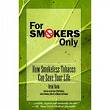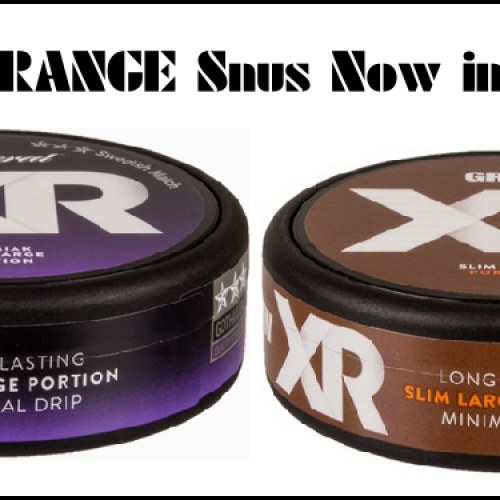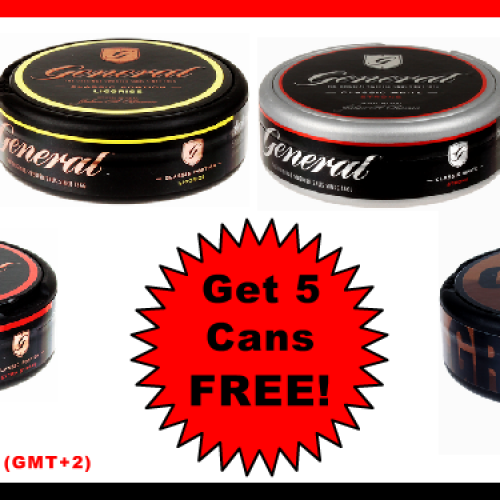Dr. Brad Rodu on Reduced Harm Tobacco
 Dr. Brad Rodu is one of the pioneers in establishing that Reduced Harm products such as any form of smokeless tobacco including snus and Swedish Snus are, as he said to me recently, “virtually 100% less harmful than cigarettes”.
Dr. Brad Rodu is one of the pioneers in establishing that Reduced Harm products such as any form of smokeless tobacco including snus and Swedish Snus are, as he said to me recently, “virtually 100% less harmful than cigarettes”.
He is also a very courageous man. When he began advocating snus as a way to stop using cigarettes and even all tobacco products, the University he was associated with came crashing down on him for being so politically incorrect. He survived but at a cost.
Dr. Rodu and the studies he published and/or participated in were the first concrete scientific evidence I discovered in my quest 3 years ago to learn as much as I could about Swedish Snus and it’s affects on the human body. He is a personal hero of mine and I confess to a little gushing when he first contacted me.
Virtually unknown is the fact that Brad Rodu’s work is soon to be validated. Phase III double-blind Clinical Trials on Swedish Snus began in 2008 and should conclude in 2010. My next article will detail the Phase III trials in yet another of my humble string of exclusives…..OK, I’m not so humble.
Below are the contents of an email I received from Dr. Rodu recently and the contents of a letter he sent back in 1994. I think you will find both fascinating.
One note before I leave you to Brad Rodu. Tobacco Research costs a lot of money. Each study can take years to complete. Pharmaceutical Studies also cost a lot of money and takes years to complete. The funding for the initial clinical trials of any prescription drug on the market today were and are funded by the Pharmaceutical companies.
FDA has never had a problem with that. Since the studies are all independent and conducted under strict medically-approved protocols, FDA has rightly concluded that since comprehensive independent testing is so expensive, why shouldn’t the pharmaceutical companies trying to get FDA approval for their new drugs pay for the studies?
History shows that in some cases, the industry-funded studies proved a drug was not effective or was even dangerous. Big Pharma obviously isn’t happy when that occurs financially, but for the safety of the American public, they accept it and go back to the drawing board. FDA has done its job.
So before the ah Ha! comments and emails start, yes, Dr. Rodu’s studies are financed in part by tobacco companies. So what? The leading treatment for the drug-resistant Swine Flu is a drug called Tamiflu. Without Big Pharma paying for the drug trials, Tamiflu would not be available today.
Who funds the research and studies is irrelevant so long as the studies are conducted ethically, without bias either way, under controlled conditions, and to strict medical protocol. The same holds true for new food products and under the Kennedy/Waxman Law (I will not call it by its official name since the name is a fraud)… yes, now tobacco products and in particular, any tobacco product which desires to be classified as Reduced Harm by FDA.
End of story on funding: no emails or comments about Big Tobacco funding, please. They will just show you didn’t read this article before responding to it. SnusCENTRAL will post them though; please use your real name so even your friends will know you are an ideologue.
Here is my latest Brad Rodu email along with the letter he attached:
Dear Larry,
Attached please find an analysis we published in 2002 that establishes the oral cancer risks for categories of smokeless products (i.e. chewing, moist snuff and dry snuff)(1).
I had some additional comments about TSNAs in Swedish and American products. It appears that heat treatment of snus started in the early 1980s. In 1980 TSNA levels in Swedish snus samples were mostly under 20 parts per million (ppm), with some variation (2). By 1984 tests from the Swedish National Food Administration showed lower levels, and a report indicated that better control by manufacturers over bacterial activity was probably the reason (3).
It is clear that heat treatment is linked to lower TSNA levels in Swedish products. However, there is no evidence that heat treatment of Swedish products has made them “reduced-risk” in comparison with American moist snuff or chewing tobacco products. The reason is that, even at pre-1980 “higher” TSNA levels, American moist snuff was associated with little or no risk of mouth cancer (1). Of course, American chewing tobacco has always shown low TSNA levels, and little or no risk. Unfortunately, American dry snuff does have elevated risks for mouth cancer (1), and this risk was inappropriately but conveniently extended to all American smokeless products during the anti-smokeless hysteria in the mid 1980s. Our review was the first to clearly distinguish the low risks for American moist snuff users and chewers from somewhat elevated risks among dry snuff users.
From a risk standpoint it is not possible to create rankings among current Swedish and American moist snuff and other products. Here is a quote from a 1997 report by the Swedish National Board of Health and Welfare: “Recent data suggest that the differences [in TSNA levels reported in American and Swedish smokeless products] have grown smaller, and that it is now questionable to make a sharp distinction between use of American and Swedish moist snuff when assessing risks – at least where TSNA content is concerned.” (4)
I think that the focus on TSNAs is diverting attention from bigger issues in tobacco harm reduction. Anti-tobacco extremists want to talk about TSNAs in order to keep attention focused on smokeless/mouth cancer images and fears. Emphasizing small, questionable differences in TSNA levels avoids having to acknowledge lower risks for smokeless use compared with smoking. I am not defending American smokeless manufacturers. If there were measurable health effects from using 12 ppm smokeless tobacco instead of 0.1 ppm products, I would be leading the charge to regulate TSNAs to 0.1 levels or lower. However, calls for manufacturers to push TSNAs below current levels ought to be based on a scientific rationale incorporating some health endpoint. Otherwise, eliminating TSNAs from tobacco makes no more sense than eliminating the 21 carcinogens in roasted coffee (5), which have not been demonstrated to confer any risks related to human consumption.
I hope this provides some information. Let me know if you have any other questions.
Best regards,
Brad
1. Oral Surg 93: 511-515, 2002.
2. Cancer Research 41: 4305-4308, 1981.
3. Food Additives and Contaminants 1: 299-305, 1984.
4. Health risks associated with moist snuff. Socialstyrelsen (Swedish National Board of Health and Welfare), Stockholm, Sweden, 1997.
5. Mutation Research 447: 3-13, 2000.
Here is an excerpt from another email and the letter I mentioned originally. So you the reader are not confused, this letter was written before Professor Rodu’s research received funding from the tobacco industry:
“The bottom line is that informed consumers make better decisions and force companies to improve their products. Speaking of Consumer Reports, I thought you might like to see a letter I sent to the Union in November 1994 (attached). The scientific foundation for tobacco harm reduction was good even 15 years ago.”
………………………………………
November 18, 1994
Rhoda H. Karpatkin
President
Consumer’s Union of the U.S.
101 Truman Avenue
Yonkers, NY 10703-1057
Dear Ms. Karpatkin,
I have been an avid reader of Consumer Reports for many years. I value the scientific methods and integrity which Consumer’s Union brings to product evaluation. Because your organization has had a serious interest in health care, I would like to present to you a novel perspective on a vital issue regarding 46 million consumers who smoke. It is a simple and scientifically sound proposal that smokers who are unable or unwilling to quit may substantially decrease their health risks by switching to smokeless tobacco.
This proposal has the potential to save many lives because smokeless tobacco use is far safer than smoking. Smoking-related cancers, heart diseases and lung disorders are responsible for 419,000 deaths every year in the U.S.A. In contrast, if all 46 million American smokers instead used smokeless tobacco, annual tobacco-related deaths (from a small risk of oral cancer) would number only 6000. In fact, smokers who switch to smokeless tobacco reduce their risk for all smoking-related illnesses, including oral cancer. Newer smokeless tobacco products deliver the nicotine kick smokers crave and they can be used almost invisibly; spitting, once the stigma of smokeless tobacco use, is minimal or nonexistent with these products. Smokeless tobacco is already working for many Americans. Statistics from the Centers for Disease Control and Prevention (CDC) show that 1.5 to 2 million former smokers have chosen this option on their own.
Enclosed please find two published manuscripts which provide the scientific basis for this proposal, as well as a flyer for a book which discusses many social and medical aspects of tobacco use. One important note: I have no personal or professional connection with the tobacco industry.
This idea is market based and does not require regulatory or legislative intervention. It requires only that informed consumers understand the true nature of tobacco-related health risks. That is my reason for writing to your organization, which has stated goals of informing the public and protecting consumers. If I can provide further information, please do not hesitate to contact me.
With Best Regards,
Brad Rodu, D.D.S.
Professor and Chair;
Oral Pathology
…………………………
Today, Dr. Brad Rodu is Professor of Medicine; Endowed Chair, Tobacco Harm Reduction Research; University of Louisville.
LARRY WATERS
FORMER Smoker; CURRENT Swedish Snus User
Reporting From SnusCENTRAL.org
About author
You might also like
Happy New Snus Year!
By the time this post is published, I, Moe Unz will be quite full of food, drink and snus. Especially drink. That is why I wrote this 2 days ago
New 2016 XRANGE Snus Products by Swedish Match: XRANGE General Salmiak & XRANGE Grov
Reporting from a pub somewhere in Sweden, Snus Legend Moe Unz writes about the arrival of the new XRANGE General Salmiak Slim Portion Snus and XRANGE Grov Slim Portion Snus.
General Variation Series Snus is history, Snus Sale, and Snus News
The latest snus news, videos, and snus sales for 10 August 2015: SnusCentral.com Send to a friend Unsubscribe Check out this Snus Sale: 14 Different Snuses ON SALE This



